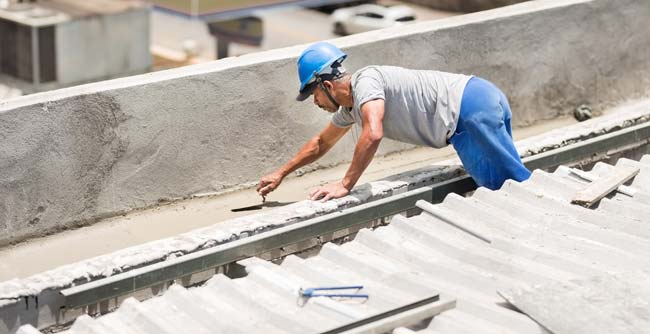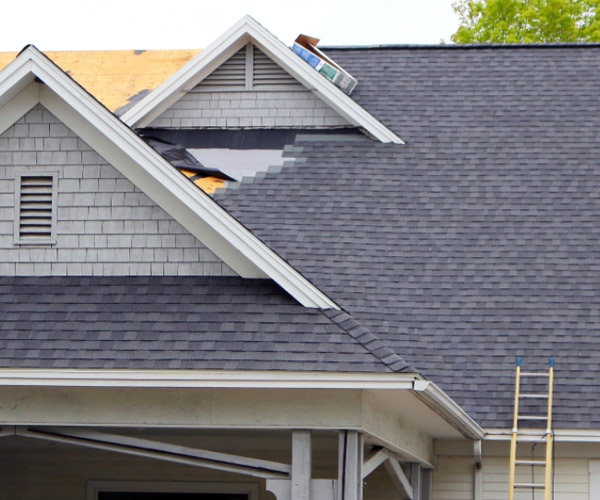Ensure durability by hiring a skilled Roofing Contractor for your project.
Ensure durability by hiring a skilled Roofing Contractor for your project.
Blog Article
How to Review Various Roofing Alternatives for Your Building Demands
Assessing roof choices for your structure needs an extensive approach that thinks about numerous factors such as the planned usage of the framework, local environment conditions, and material attributes. It is necessary to weigh the advantages and disadvantages of different roof covering kinds, from asphalt tiles to steel and clay tiles, while also considering preliminary costs and lasting maintenance. Additionally, recognizing power efficiency and visual charm can influence your decision. As you ponder these factors to consider, one concern continues to be: which factors will inevitably guide your choice for a sustainable and visually pleasing roof covering option?
Assessing Your Building's Requirements
To efficiently evaluate roofing options, start by completely examining your building's demands. Begin by taking into consideration the structure's meant use, as various frameworks might demand differing roofing specs. Domestic roofing systems typically prioritize looks and insulation, while commercial buildings may focus on resilience and load-bearing ability.
Next, review the neighborhood climate conditions that will impact roofing efficiency. Aspects such as temperature level fluctuations, precipitation degrees, and wind patterns can affect material choice and layout. A roofing system that masters a pleasant environment might not perform as well in locations susceptible to heavy snowfall or extreme warmth.
Additionally, examine the structural stability of your structure. Guarantee that the existing framework can sustain the selected roof materials, particularly if thinking about larger options. It is additionally crucial to examine any kind of local structure codes or laws that may determine details requirements for roof.

Contrasting Roof Products
As soon as a comprehensive evaluation of your building's demands has actually been completed, the next step includes contrasting numerous roof materials. Each material offers distinctive advantages and disadvantages, making it important to straighten your selection with your specific needs and situations.
Asphalt tiles are widely acknowledged for their price and convenience of installation, making them a popular alternative for household structures. On the other hand, metal roof, understood for its toughness and long life, can hold up against harsh climate condition however might come with a higher preliminary investment.
Clay and concrete tiles provide superb thermal insulation and visual allure, specifically for Mediterranean-style design, yet they need a more durable architectural support as a result of their weight. Timber drinks deal a natural appearance and good insulation homes yet may require extra maintenance and are vulnerable to fire hazards.
Evaluating Expense and Budget
Analyzing your roof covering options demands a cautious assessment of cost and budget considerations. The overall allocate a roof covering project comprises several elements, including material expenses, labor costs, maintenance, and possible lasting savings. It is vital to establish a clear budget prior to discovering specific roofing materials, as this will certainly lead the decision-making process and help you stay clear of overspending.
Begin by obtaining quotes from several contractors to comprehend labor costs in your region. Ensure that these estimates include all essential solutions, such as removal of the old roof, installation, and any additional attributes, like insulation or air flow renovations - Roofer. Next, assess the price of numerous roofing products, taking into account both initial installation prices and expected life-span

Understanding Energy Performance
Power effectiveness plays a critical duty in the choice of roof products and systems, considerably influencing both energy intake and overall comfort within a structure. An appropriate roof covering can enhance thermal efficiency, decreasing the demand for home heating and cooling down systems, which consequently reduces energy expenses and reduces environmental influence.
When examining roof covering options, take into consideration materials that mirror instead of take in warmth. Light-colored or reflective roofing items can significantly lower roof covering surface area temperatures, leading to reduced energy visit the site usage during hot months. In addition, proper insulation and ventilation are necessary to maximize the energy efficiency of the entire roof system. Insulation prevents heat transfer, while air flow alleviates heat buildup in the attic room room.
Another crucial element is the roofing system's longevity and upkeep demands. Long lasting materials that call for less constant substitute add to long-term power savings. The energy efficiency of a roof covering system can additionally be assessed with its compliance with well established sustainability rankings such as ENERGY STAR or LEED.
Thinking About Visual Charm
A roof covering's visual charm substantially affects the general appearance of a building, enhancing its architectural design and improving aesthetic charm. Roofer. When evaluating roofing choices, it is important to think about how the chosen material, color, and design will balance with the existing structure and neighborhood. A well-designed roof can raise even the simplest of structures, changing them right into aesthetic centerpieces
Various roof materials provide different aesthetic top qualities. For example, traditional roof shingles may evoke a timeless charm, while steel roof covering can give a modern-day, page smooth appearance. Additionally, the shade of the roofing material plays an essential function; lighter shades can make a building show up more spacious, while darker tones may create a cozier ambiance.
Furthermore, architectural aspects, such as dormers and eaves, can boost the roofing's visual influence. It is a good idea to speak with professional developers or engineers to ensure the selected roof choice aligns with the general design intent. Inevitably, a roof ought to not only offer useful advantages however also contribute favorably to the structure's visual, reflecting the proprietor's preference and the character of the surrounding setting.
Verdict

Report this page